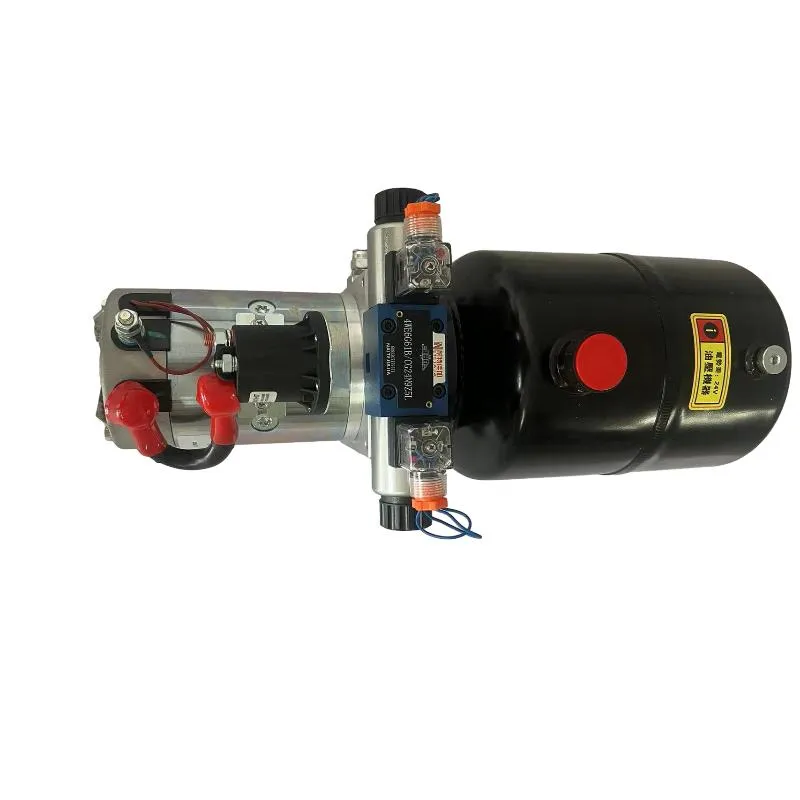Oct . 21, 2024 12:00 Back to list
Gas-Powered Hydraulic Power Units for Efficient Industrial Applications and Custom Solutions
The Rise of Gas-Powered Hydraulic Power Units A Game-Changer for Industrial Applications
In the ever-evolving world of industrial machinery, gas-powered hydraulic power units (HPUs) have emerged as a significant innovation, revolutionizing how power is generated and utilized across various sectors. These units, known for their efficiency, portability, and reliability, are increasingly becoming the backbone of various applications, from construction sites to agricultural fields and emergency rescue operations.
Understanding Gas-Powered Hydraulic Power Units
At its core, a gas-powered hydraulic power unit is a machine that utilizes gas engines to drive hydraulic pumps, converting mechanical energy into hydraulic energy. This energy is then transmitted through hydraulic fluid to power various tools and machinery. Unlike traditional electrically powered units, gas-powered models offer unmatched mobility and flexibility, allowing users to operate equipment in remote locations without the need for extensive electrical infrastructure.
Advantages of Gas-Powered HPUs
One of the most compelling advantages of gas-powered hydraulic power units is their exceptional mobility. These units can be transported easily to various job sites, making them ideal for projects that require flexibility and quick setup times. For example, in construction and landscaping, workers often face the challenge of working in different locations daily. Gas-powered HPUs allow them to bring the power with them, eliminating the hassle of finding a nearby power source.
Moreover, gas-powered HPUs are known for their robust performance. They deliver impressive power levels, capable of handling heavy-duty tasks such as lifting, hoisting, and operating various hydraulic tools. This makes them popular choices in sectors that rely on high-pressure hydraulic systems, such as mining and forestry, where equipment must perform reliably under demanding conditions.
Environmental Considerations
While gas-powered machinery has historically faced scrutiny regarding environmental impact, modern advancements in engine technology have led to more eco-friendly options. Manufacturers are now designing gas engines that comply with stringent emissions regulations, reducing their environmental footprint without sacrificing performance. With the incorporation of features such as catalytic converters and advanced fuel management systems, gas-powered HPUs are becoming a greener choice for industrial applications.
gas powered hydraulic power unit company

Versatility Across Industries
The versatility of gas-powered hydraulic power units makes them invaluable across industries. In the construction sector, they are utilized to operate equipment such as excavators, augers, and concrete saws. In agriculture, these units power hydraulic lifts for grain handling and operate specialized machinery for planting and harvesting. Emergency services leverage gas HPUs for hydraulic rescue tools, ensuring they can operate in disaster scenarios where traditional power sources may be unavailable.
Additionally, the adaptability of these units means they can be equipped with various hydraulic attachments, enhancing their utility across multiple tasks. This versatility not only maximizes the equipment’s lifespan but also offers significant cost savings for companies that can deploy a single unit for various applications.
Future Trends and Innovations
As industries continue to embrace automation and efficiency, the future looks promising for gas-powered hydraulic power units. Innovations in engine design, combined with advances in hydraulic technology, are paving the way for more powerful, compact, and fuel-efficient units. Additionally, the integration of smart technology and IoT (Internet of Things) capabilities could revolutionize how these units are monitored and operated, allowing for real-time performance tracking and predictive maintenance.
Moreover, as industries strive to meet sustainability goals, the demand for hybrid solutions combining gas and renewable energy sources is likely to increase. Such hybrid systems could enhance operational efficiency while further reducing environmental impact, making gas-powered HPUs more attractive than ever.
Conclusion
In summary, gas-powered hydraulic power units are making significant strides in the industrial sector, providing flexibility, power, and efficiency for a variety of applications. With ongoing advancements in technology and a growing focus on sustainability, these units are set to remain an integral part of industrial operations. As businesses continue to adapt to changing work environments and demands, investing in gas-powered HPUs could be a strategic decision that enhances productivity while meeting the needs of a modern workforce. The future of hydraulic power generation promises to be as dynamic and powerful as the units themselves, driving innovation across multiple sectors for years to come.
-
Fork Lift Power Units - Hebei Shenghan | Efficiency, Reliability
NewsJul.13,2025
-
1.5-Ton Turbocharged Cylinder-Hebei Shenghan|Hydraulic Solution,Energy Efficiency
NewsJul.13,2025
-
Auto Hoist Power Units-Hebei Shenghan|Efficiency&Industrial Lifting
NewsJul.13,2025
-
Double Acting Power Units-Hebei Shenghan|Hydraulic Solutions,Industrial Efficiency
NewsJul.13,2025
-
1.5 Ton Lifting Cylinder 70/82-40-290-535 - High-Performance Hydraulic Solution | Hebei Shenghan
NewsJul.13,2025
-
Fork Lift Power Units - Hebei Shenghan | Efficiency&Reliability
NewsJul.13,2025
